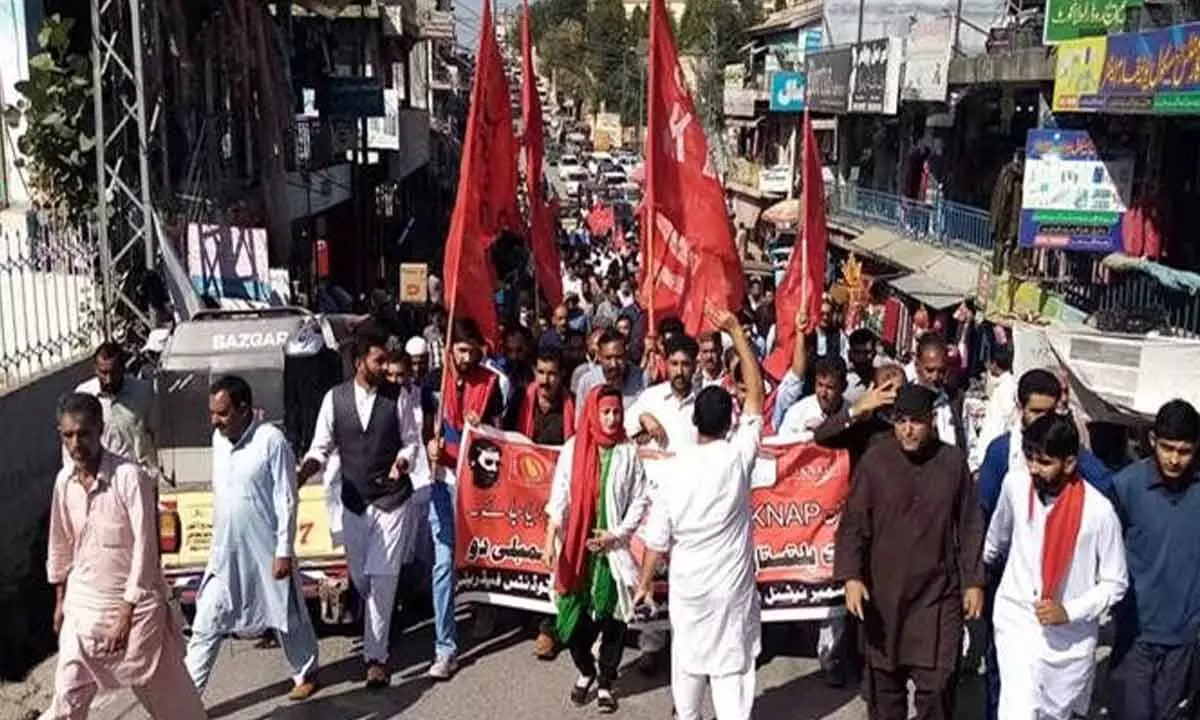The gathering storm of anti-Pak sentiments

In a hurriedly called meeting of the senior executive members of the Gilgit-Baltistan Awami Action Committee held in Gilgit this week, it was decided that if the government of Pakistan does not reverse its decision restore wheat subsidy by June 2 then the Committee will have no choice but to take to the streets in protest.
In a hurriedly called meeting of the senior executive members of the Gilgit-Baltistan Awami Action Committee held in Gilgit this week, it was decided that if the government of Pakistan does not reverse its decision restore wheat subsidy by June 2 then the Committee will have no choice but to take to the streets in protest.
Similar meetings were held in Astore and Shagar districts of Pakistan occupied Gilgit-Baltistan (PoGB) during which protest committees were set up at 'mohallah' (neighbourhood) level. Manzoor Parwana, leader of Gilgit-Baltistan United Movement, has warned that the subsidy given to PoGB is not charity but an obligation set up by the resolutions of the UN since the region is disputed. He told this scribe that due to cuts in wheat subsidy the cost of a bag of flour would increase by at least 1,000 PKR.
Pensioners Association in Pakistan occupied Jammu Kashmir (PoJK) have threatened a sit-in at the new civil secretariat in Muzafarabad. They are asking for the implementation of the notification regarding 10 per cent increase in their pensions. On May 31, members of the PoJK Assembly made fiery speeches against the Pakistan government's decision to cut 7.5 billion PKR from THE PoJK development fund and an additional 7 billion PKR from the current PoJK budget. It is already common knowledge that the government will make a further cut of 10 billion PKR from the 2022-23 PoJK budget.
This much needed finance will further deprive PoJK of indispensable infrastructure development. Currently there are 49 colleges in PoJK that have no rooftop. Several colleges lack facilities such as science and computer laboratories, furniture and even adequate number of teaching and administrative staff.
The condition of roads and hospitals in PoJK is no different. Every day our people plunge to their deaths in ravines in road mishaps due to lack of safety walls. Scores of patients die each month due to lack of basic medical facilities and anti-venom vaccines. Hence, it is not hard to imagine the effect budget cuts are going to have on the already finance starved economy of PoJK.Pakistan's trade deficit lurks between $35-$40 billion and its foreign currency reserves remain minimal (below $16 billion). There seems to be no quick remedy to fix a chronic loan-dependent economy. Loans are like steroids. They might act as a quick fix for an acute medical condition such as inflammation, but in the long run it ends up doing more harm than good since long term use of steroids weakens one's immunity, causes thinning of bones and high blood pressure.
The adverse effects of spillover of Pakistan's economic hardship into PoJK/GB are already being felt as families of migrant workers make calls to their loved ones abroad asking for more money to run their kitchen. In the coming days and months as the economic strife of the people of PoJK/GB becomes acute, there will be protests across the occupied territories which could very easily turn into an anti Pakistan occupation movement.
The gathering storm of public discontent and the incapacity of the PoJK/GB puppet governments to address issues of employment, pensions and, health and education will expose the worthlessness of the slogan 'Qalma Ka Rishta' (bond of faith) with Pakistan and unmask the true nature of the relation between the oppressor and the oppressed.
PoJK/GB have been suffering from a humanitarian crisis for quite sometime now. The current economic hardship might just prove to be the last straw that broke the back of the camel. Undoubtedly, the public discontent simmering below the surface is akin to the molten of a volcano waiting for the right pressure to build up in order for it to burst out into the open and become free.
(Dr Amjad Ayub Mirza is an author and a human rights activist from Mirpur in PoJK. He currently lives in exile in the UK)
















